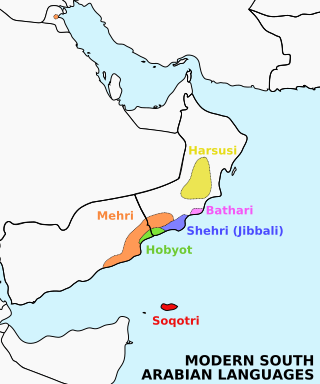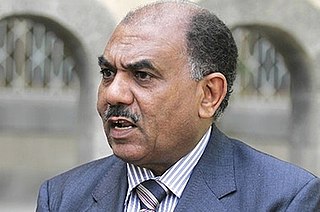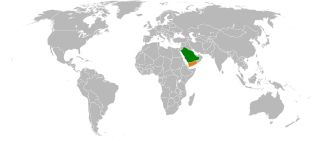
The Arabian Peninsula, or Arabia, is a peninsula in West Asia, situated northeast of Africa on the Arabian Plate. At 3,237,500 km2 (1,250,000 sq mi), the Arabian Peninsula is the largest peninsula in the world. It is also known as the Arabian subcontinent.

Yemen, officially the Republic of Yemen, is a country in West Asia. It is situated on the southern end of the Arabian Peninsula, and borders Saudi Arabia to the north and Oman to the northeast and shares maritime borders with Eritrea, Djibouti and Somalia. Yemen is the second-largest Arab sovereign state in the Arabian Peninsula, occupying 555,000 square kilometres, with a coastline stretching about 2,000 kilometres. Its constitutionally stated capital, and largest city, is Sanaa. As of 2023, Yemen has an estimated population of 34.2 million.

The Modern South Arabian languages (MSALs), also known as Eastern South Semitic languages, are a group of endangered languages spoken by small populations inhabiting the Arabian Peninsula, in Yemen and Oman, and Socotra Island. Together with the modern Ethiopian Semitic languages, the Western branch, they form the South Semitic sub-branch of the Afroasiatic language family's Semitic branch.

Mehri or Mahri is the most spoken of the Modern South Arabian languages (MSALs), a subgroup of the Semitic branch of the Afroasiatic family. It is spoken by the Mehri tribes, who inhabit isolated areas of the eastern part of Yemen, western Oman, particularly the Al Mahrah Governorate, with a small number in Saudi Arabia near the Yemeni and Omani borders. Up to the 19th century, speakers lived as far north as the central part of Oman.

Pre-Islamic Arabia refers to the Arabian Peninsula before the emergence of Islam in 610 CE.
The Saudi–Yemeni War was a war between Saudi Arabia and the Kingdom of Yemen in 1934.
Mayfa' Abdel Rahman al-Qiyadi was a Yemeni short story writer and journalist. He studied at the Gorky Institute in Moscow and obtained an MA in 1982. He is known for his short stories which explore the social and political realities of Yemen. His first collection of short stories appeared in 1975, followed by a second one in 1983. His work has appeared in English translation in a 1988 anthology called The Literature of Modern Arabia.
Junaid Muhammad Junaid is a Yemeni poet. He worked as a teacher in Aden. His first book of poetry was called A Garland for a Qaitbani Woman. And was translated into English and included in a 1988 anthology on modern Arabian literature.

Hasan Ahmad al-Lawzi was a Yemeni politician and writer. He was the Minister of Information.
Abd al-Karim al-Razihi is a Yemeni poet. His first book of poems was titled The Need for a Second Heaven and an Additional Hell. He worked at the Yemeni Ministry of Culture in Sanaa, and edited the magazine Al-Yaman al-Jadid.
Muhammad al-Shurafi is a Yemeni poet and playwright. He was born in Hajja Governorate and studied at Cairo University. Subsequently he joined the Yemeni foreign service. al-Shurafi has published more than twenty books, including poetry collections, plays and verse plays. His poetry is notable for its engagement with social issues, particularly that of women's rights.
Abd al-Majeed al-Qadi is a Yemeni playwright and writer. His work is notable for its engagement with social problems that afflict Yemen. His first two plays were called Al-Daudahi's Daughter and Young Man Mansour. His short story, "The Final Ring", has been translated into English and appeared in a 1988 anthology on modern Arabian literature.
Salih Saeed Ba-Amer is a Yemeni short story writer. He was born in Hadhramaut province. His story Dancing by the Light of the Moon has been translated into English and was included in a 1988 anthology of modern Arabian literature.
Saeed Aulaqi is a Yemeni dramatist and fiction writer. His story "The Succession" has been translated into English and was anthologized in two anthologies published in the West. As a playwright, he has tackled revolutionary themes and published a number of plays:
Kamal Haydar (1933–1980) was a short story writer from southern Yemen. He was noted for his stories that dealt with social issues in Yemen. He published a collection of his short stories, Signpost (1978), only two years before his death. One of his stories, "A Man of No Consequence", was translated into English by Olive Kenny and Thomas Ezzy and appeared in a 1988 anthology of modern Arabian literature.
Muhammad Salih Haydara is a Yemeni journalist and short story writer from southern Yemen. He was raised in Aden and studied communication at Cairo University. He has published several volumes of short stories including his debut collection A Wanderer from Yemen (1974), Very Much an Adolescent (1978) and Migrating Clouds (1980). His story "The Imprint of Blackness" has appeared in two English-language anthologies, namely The Literature of Modern Arabia (1988) and Between the Lines: International Short Stories of War (1994).
Abdulrahman Fakhri was a Yemeni poet and literary critic. He was born in Aden and studied political science at the American University of Beirut. He served as Deputy Minister at the Yemeni Ministry of Justice and later as Adviser at the Yemeni Ministry of Culture & Guidance as well as Secretary-General of the Yemeni Writers Union prior to taking up a position at the United Nations Secretariat in New York from 1978 to 1996. He retired from the United Nations in 1997 and returned to live in Aden, Yemen.

Saudi Arabia and Yemen relations refers to the current and historical relationship between the neighbouring sovereign states of Saudi Arabia and Yemen. The two countries at one time did enjoy good relations and closely cooperated in military, economic and cultural issues. Now because of the ongoing Yemeni Civil War and the realignments of power in the Middle East with the emergence of al-Qaeda and the radicalization of some factions of Islam, Saudi Arabia has led a military intervention into Yemen.

On 26 March 2015, Saudi Arabia, leading a coalition of nine countries from West Asia and North Africa, launched an intervention in the Yemeni Civil War in response to calls from the president of Yemen Abdrabbuh Mansur Hadi for military support after he was ousted by the Houthi movement. The conflict ignited between the government forces, the Houthi rebels and other armed groups after the draft constitution and power-sharing arrangements collapsed, despite progress in the political transition led by the United Nations at that time, leading to an escalation of violence in mid-2014. The Houthis and allied units of the armed forces seized control of Sana’a and other parts of the country in September 2014 and in the following months. This prompted President Hadi to ask Saudi Arabia to intervene against the Iranian-backed Houthis.
Pre-Classical Arabic is the cover term for all varieties of Arabic spoken in the Arabian Peninsula until immediately after the Arab conquests in the 7th century C.E. Scholars disagree about the status of these varieties.






